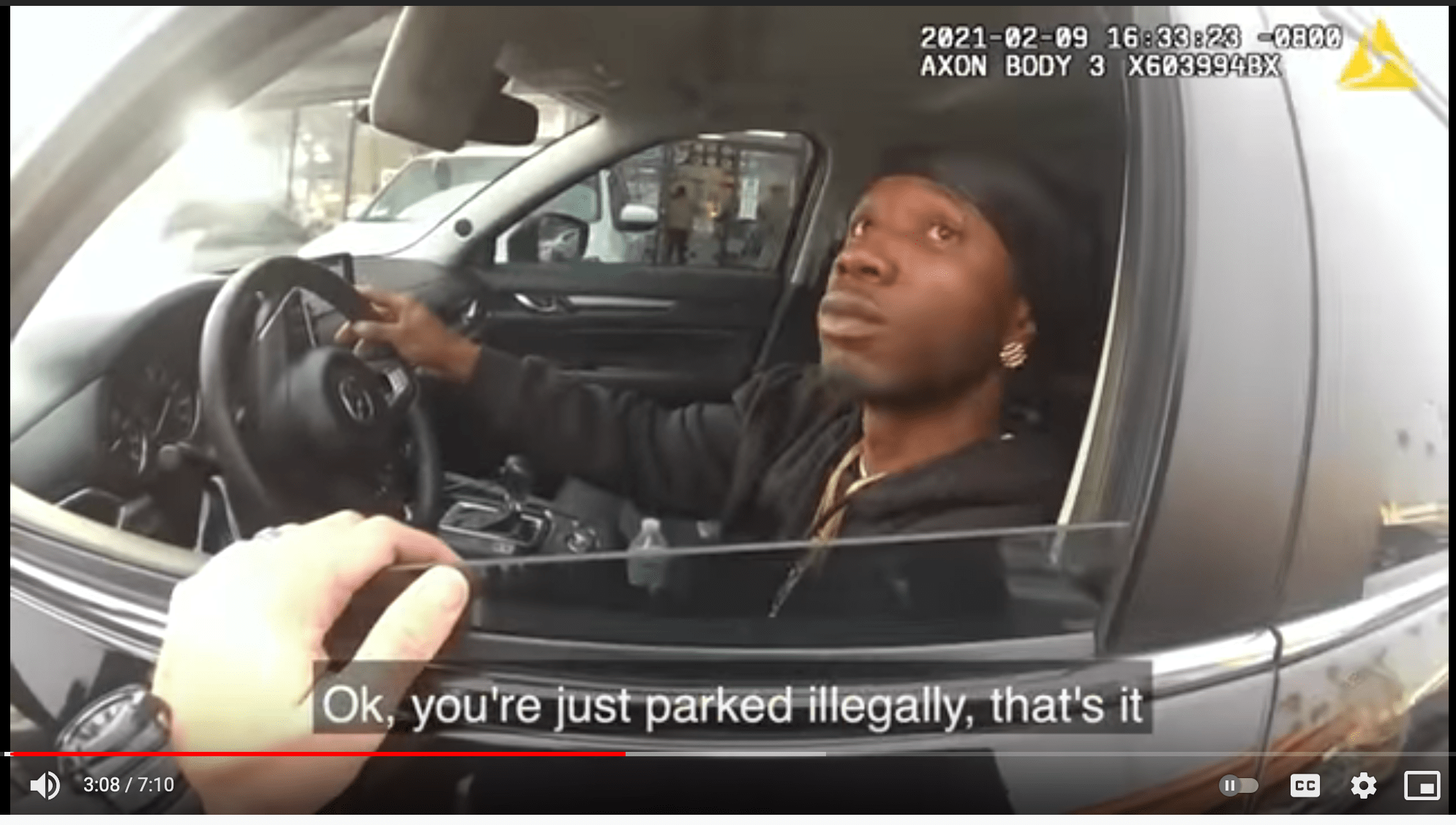Remarkably, Travis Elster is alive and unscathed after at least three of eight total shots LAPD officer Carlos Tovar fired at him pierced his windshield.
Elster had been idling in the parking lot of a Chinese takeout restaurant near Manchester and Figueroa at around 4:30 p.m. on February 9 when officers engaged him under the pretext that he was double parked. After being told to turn off his vehicle rather than to move along, Elster carefully maneuvered his SUV around Tovar (who was positioned near the front of Elster's vehicle) and drove away. Though Tovar fired eight shots at his vehicle, Elster ultimately managed to elude police after making it to a dollar store at Crenshaw and Imperial (about five miles away), changing his shirt, and slipping back out undetected.
But he's not out of the woods.
LAPD is now accusing the thirty-year-old Compton resident of assault with a deadly weapon.
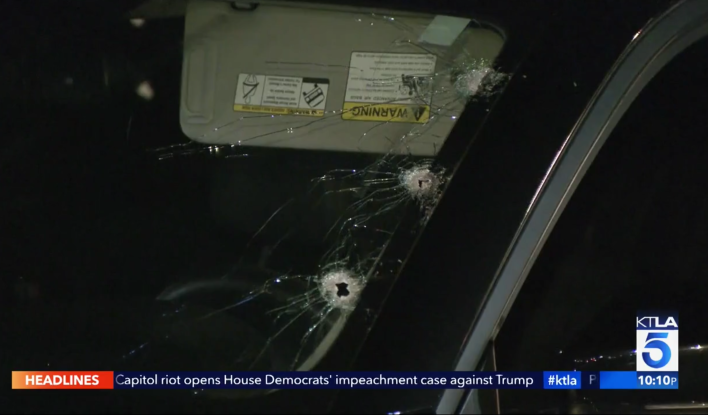
Framing a suspect
LAPD is claiming that Elster tried to run Tovar over.
At least, that's one of the things LAPD has said to try to justify the otherwise out-of-policy shooting. The official story keeps changing.
Speaking to the press on scene on the night of the incident, Detective Meghan Aguilar stated that during a traffic stop near Manchester and Figueroa, "[Elster] backed up toward the officers, and at that time there was an officer-involved shooting." ABC7 ran with that language, but said Elster had "backed up toward their cruiser," after which "[the officers] opened fired, and the driver took off."
KTLA, whose video report from the scene bears the title, "Assault suspect escapes police following failed traffic stop, hunt at Inglewood shopping center," also painted Elster as a dangerous aggressor. Officers had tried to make a traffic stop, said reporter Kimberly Cheng, "but police say he tried to run an officer over." Cheng also described Elster as having run into the discount store "with customers and workers inside," implying he had posed a threat to innocent people.
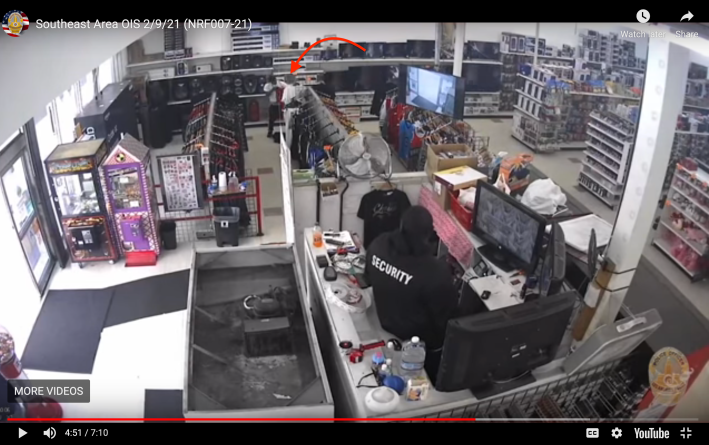
LAPD tweets that same night described Elster as unwilling to comply with commands during a traffic stop and reiterated the claim that Elster had backed up towards both officers before fleeing the scene.
But a week later, on February 16, a new version of the official story was posted on the LAPD website. In this statement, the "traffic stop" was motivated explicitly by the "equipment violation" (the parking issue is not mentioned). And Elster was now said to have accelerated toward just one officer, who is depicted as having shot at Elster because his life was in danger:
The driver accelerated the vehicle towards the partner officer [Tovar] who was standing at the front of the vehicle. The partner officer ordered the suspect to stop, however, the suspect continued driving towards him and an Officer-Involved Shooting occurred.
Incidentally, the body camera footage released March 12 as part of the critical incident briefing (below) clearly shows Elster deliberately maneuvering his vehicle to avoid the officer. Which may be why Media Relations' Captain Stacy Spell offers an entirely new twist that paints Elster as having made Tovar fear for his life. [See minute 1:24-2:04.]
In this iteration, the traffic stop was due to both the parking and equipment violations, and when Elster "accelerated toward" Tovar, he "raised his arm as he drove toward [Tovar]," prompting the officer, "who was standing near the front of Elster's vehicle," to fire. [Emphasis added]
While "near the front of Elster's vehicle" can be read as tacit acknowledgment that Tovar was not at risk of being run over, this startling new piece of information - that Elster had "raised his arm" - is meant to imply Elster had been armed or gestured in such a way that made Tovar believe that he was armed.
The explicit effort to inject officer fear into the equation - a claim that generally gets officers off the hook for police shootings - signals LAPD is aware of just how far out of policy this shooting is and how hard it will be to justify it.
Department policy is clear that officers should not shoot at or from moving vehicles unless the officer's life or the lives of others are in immediate peril and there is no other way to escape this peril:
Firearms shall not be discharged at a moving vehicle unless a person in the vehicle is immediately threatening the officer or another person with deadly force by means other than the vehicle. The moving vehicle itself shall not presumptively constitute a threat that justifies an officer's use of deadly force. An officer threatened by an oncoming vehicle shall move out of its path instead of discharging a firearm at it or any of its occupants. Firearms shall not be discharged from a moving vehicle, except in exigent circumstances and consistent with this policy regarding the use of Deadly Force.
The only part of the policy Tovar was in compliance with was stepping out of the way.
Even so, the effort LAPD put into framing Elster as an aggressor paid off. When pulling snippets of the critical incident video for their report on the case Friday night, CBS2 staff apparently did not bother to look at the footage they repackaged.
If they had, they would have seen that it handily refuted many of the LAPD's claims. Instead, they wrongly reported that LAPD had encountered Elster parked illegally on Manchester Ave. and that "from the perspective of the 2nd officer's body cam video, you can see the suspect almost run over one of the officers."
Unpacking the "traffic stop"
The engagement of Travis Elster aptly illustrates what a "traffic stop" looks like in a community that has been repressively policed for decades. In doing so, it also makes a strong case for the abolishment of the practice.
A pretextual stop is not a benign traffic-related encounter. Labeling it as such helps shield both the officers and the department from scrutiny about bias. It ensures an individual's behavior will only be seen through the lens of compliance/noncompliance with the pretext for the stop (rather than as a reaction to the legitimacy of the stop). Their noncompliance with that pretext, in turn, will then be seen as evidence that the individual had something to hide. And if they had something to hide, then it will be assumed they must have posed a threat to the officer, meaning the officer was right to make the stop, and right to use force, in cases where it came to that.
One only need look at the "traffic stop" gun porn clogging LAPD's twitter feed to be reminded that these kinds of pretextual stops are common practice in historically disenfranchised communities, where officers know that if they find a weapon or some other contraband, it will be harder for that individual to question the constitutionality of the search. Especially if officers can claim that the individual is gang affiliated.
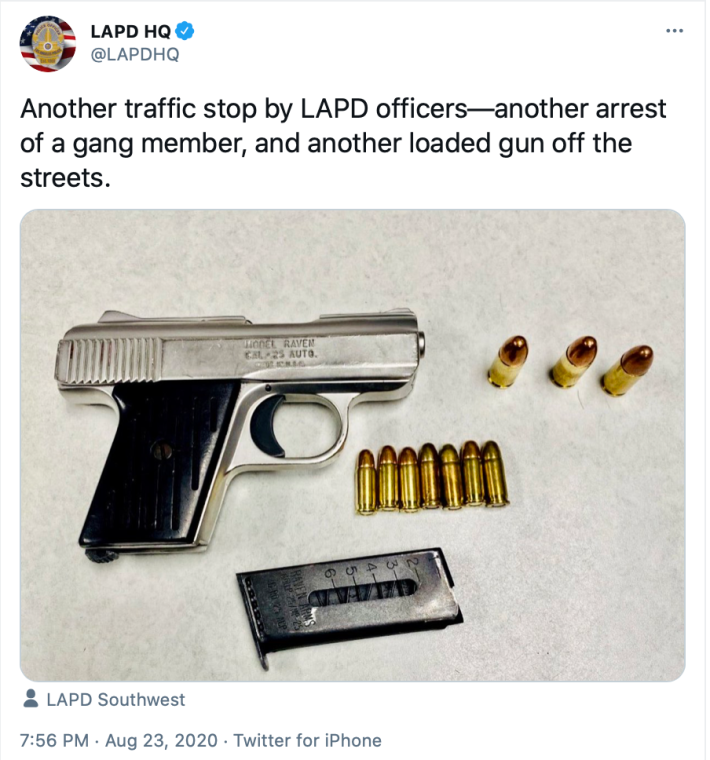
For Black men in particular, who are stopped at disproportionately high rates in L.A., these stops serve as a reminder of the myriad ways they have been set up to fail.
The harmful combination of over/underpolicing that has long characterized LAPD's presence in South Central has compounded the hostility of the streets to generations of young men. Regularly disrespected, interrogated about their right to be somewhere, asked about their parole/probation status, frisked for weapons when they, their friends, or their family members step foot into the public space, and/or treated as suspects when officers come to investigate an incident, they are effectively taught from a young age that they cannot count on law enforcement as a resource.
But if they seek out ways to fend for themselves - even just to get back and forth to school safely - pretextual stops help the city punish them for having felt the need to do so. Should they be caught carrying a defensive weapon, they will be treated as the danger, not engaged about why they feel so unsafe. Should they affiliate with a street organization – as many do to reclaim some sense of power over place, find an outlet for their traumas, and/or feel like someone has their back in the streets – they’ll be treated as the source, rather than the product, of blight. Should they protest regularly being profiled or searched, they may find themselves hit with bogus citations, arrested for resisting arrest, or even brutalized. And should they simply be existing in their neighborhood, they will be reminded that their streets are not their own and that their lives can be disrupted at will.
Like when they’re waiting for takeout.
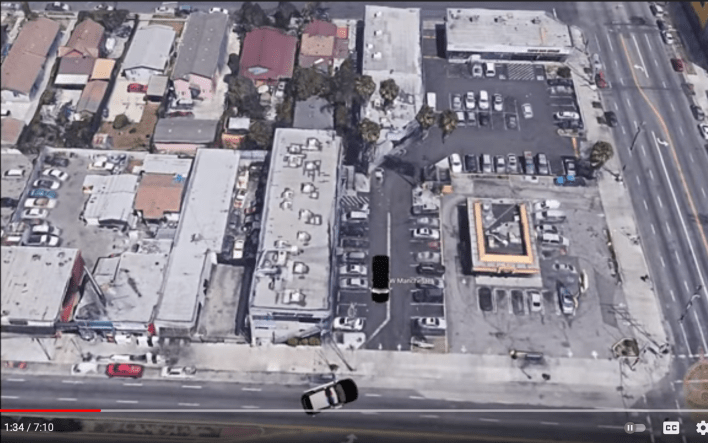
Rewinding the tape
Although the first officer opens the encounter by saying, “You’re just parked illegally, that’s it,” and half-heartedly notes Elster’s windows are tinted, it is immediately clear that the officers are not motivated by concern over parking practices.
Elster immediately knows it too. He’s idling in gear, but there is no request that he move along. He is not asked about how long he has been there or how long he intends to stay. Nor is there any attempt to verify he is indeed waiting for his mom, despite the fact that at least one person can indeed be seen standing at the Chinatown Express counter through Elster’s window. He is not told they want to give him a warning or fix-it ticket for his windows. And he isn’t asked about his license and registration.
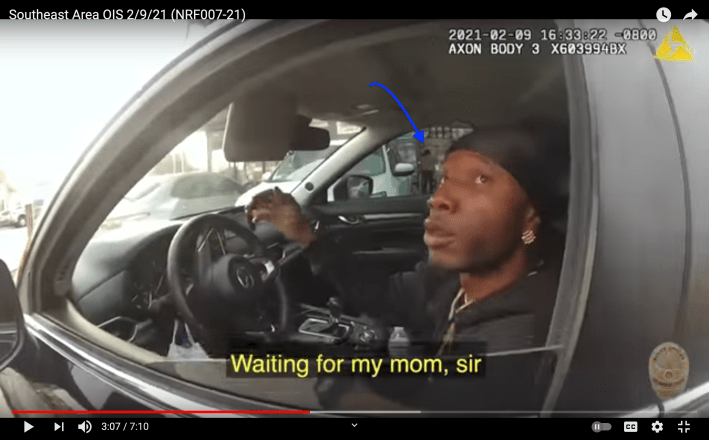
The tone remains cordial, but the encounter is already tense.
The officer is resting his hand halfway in Elster's window while Tovar, the partner officer, has taken up position at the front end of Elster's vehicle to prevent him from leaving. Then, when the first officer tells Elster the parking thing is "No big deal” and asks, “Can you turn off the car for me?," he briefly reaches further inside the vehicle to gesture at the ignition.
These are all forms of escalation.
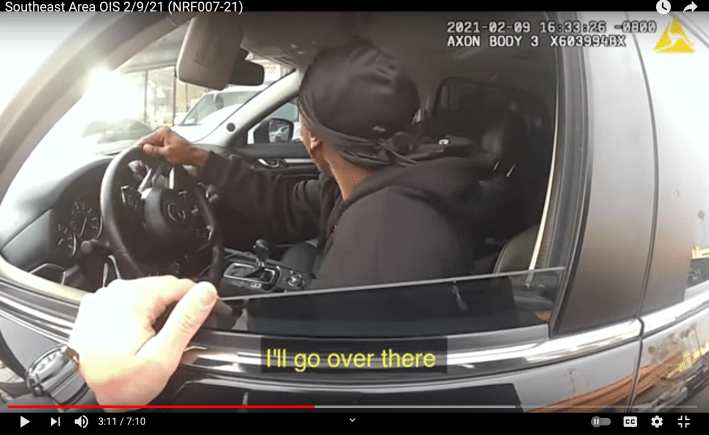
Elster appears to have read where this is headed and tests the officer's sincerity by offering to find a place to park.
He is told this is not an option and that he needs to shut the car off in the very place where he is supposedly causing such a problem.
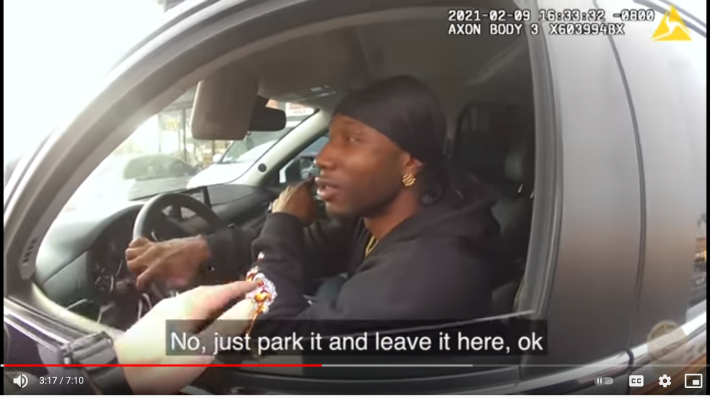
Elster continues slowly turning his wheel towards the left as he professes his willingness to park elsewhere.
Given LAPD's new claim that Elster raised his arm as he drove past Tovar, it is imperative to point out that, at this juncture, the first officer has not indicated that he has seen anything in the vehicle that has made him feel threatened.
There is no warning made to Elster not to move or to Tovar regarding the presence of any weapons. Elster is calm and both of his hands are empty and hovering around the wheel throughout the encounter. And the officer's own weapon remains holstered throughout the encounter (he is not seen reaching for it until after Tovar has opened fire and Elster is almost out of the parking lot, at 4:13 in the briefing video).
Even as Elster begins inching forward to make a run for it, both of his hands are readily visible on the wheel as he pulls left, hand over hand.
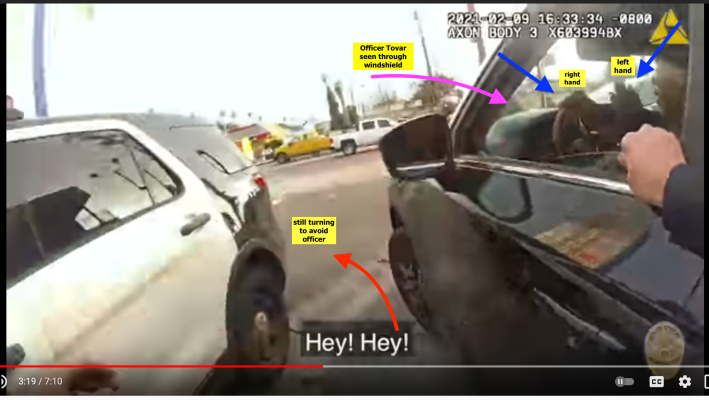
Since LAPD also claimed that Elster tried to run Tovar over, it is important to make clear just how far to the left Elster manuevered the vehicle to avoid hitting him (and how unlikely it is that Elster would have "raised his arm" at Tovar while working so hard to not injure him).
Below we can see just how much space - more than a door length - there is between the LAPD cruiser and Elster's SUV at the start of the encounter.
By the time Elster is pulling away (bottom two frames), his vehicle has gone from facing directly southward (parallel to the LAPD cruiser), to cutting sharply to the southeast.
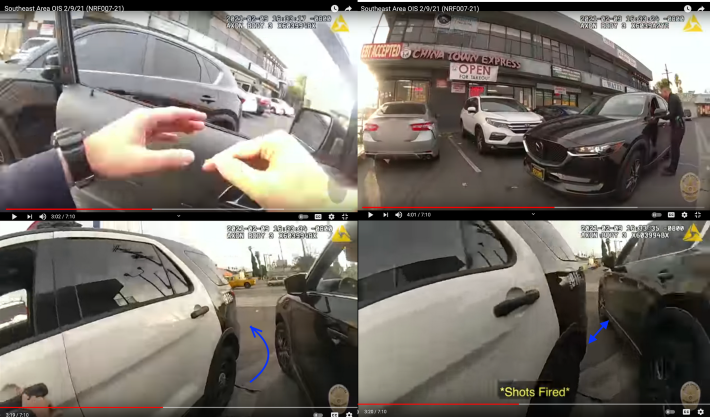
That southeasterly shift is harder to see in the footage from Tovar's perspective at first, but becomes evident as Elster heads toward the exit of the lot.
In the sequence below, Tovar first puts his hand on the hood in alarm, shouting, "Yo! Yo! Yo!," but then immediately steps back (second image); Elster continues to swing the vehicle as far left as he can to avoid Tovar (last two frames).
Tovar does not pull out his gun until he is fully out of harm's way.
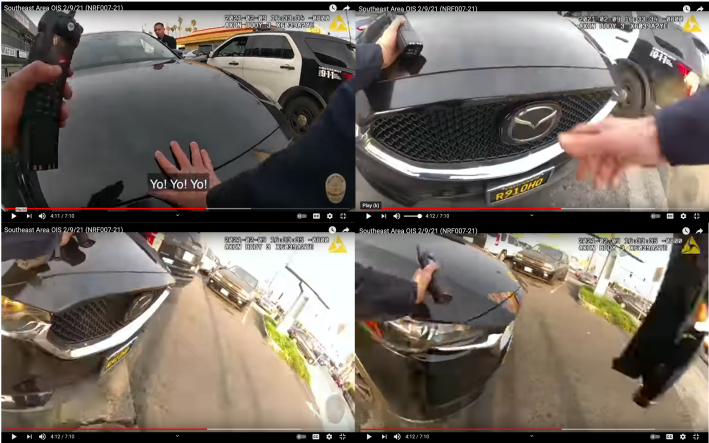
Below, we can see how far away Elster has swung from Tovar when the first shots are fired; Elster's front wheel is still angled toward the southeast.
There is no danger to Tovar at this point. But the parking lot seen to the right of Elster is full of Church's Chicken patrons that could be hit by a stray bullet.
Tovar fires anyways.
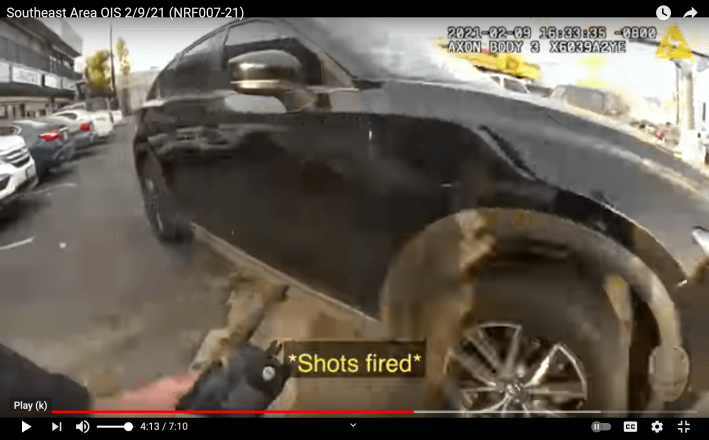
Elster is not seen making any kind of threatening gestures toward the deputy either above or below, but Tovar continues firing at him at point blank range.
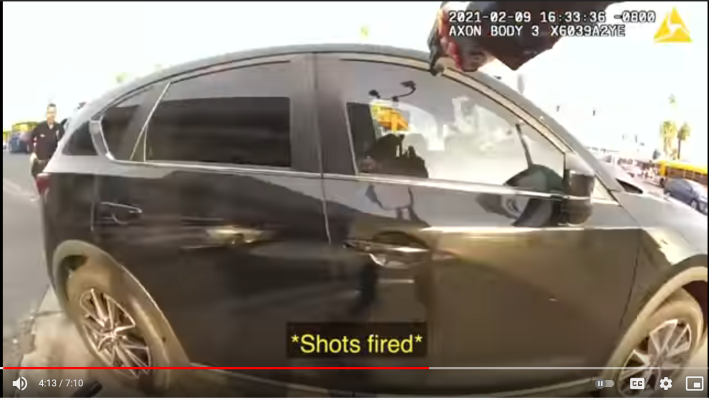
Eight times.
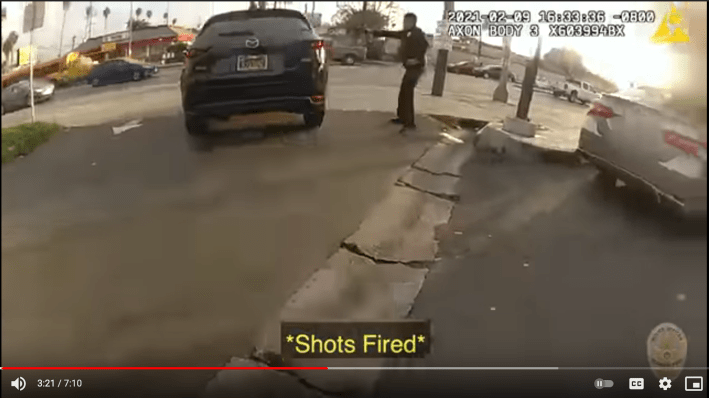
Into a busy street.
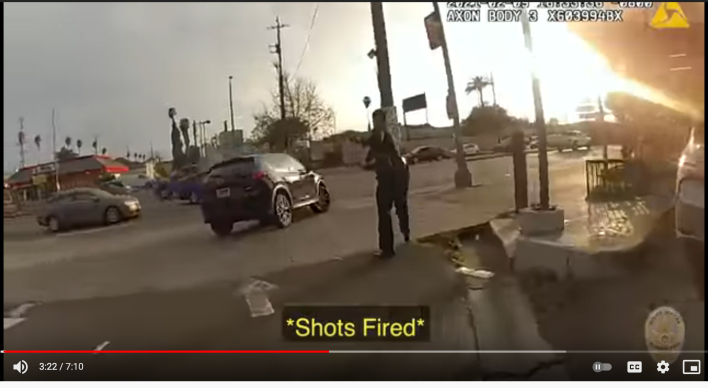
Without regard for the public, despite being in no danger whatsoever.
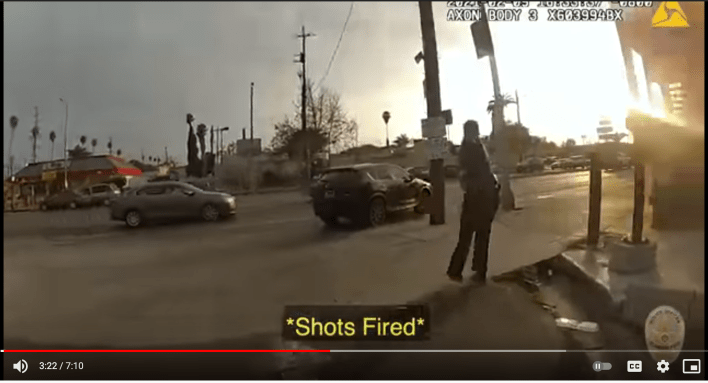
Life, interrupted
In their Monday broadcast, ABC7 reported that LAPD is looking into "whether the officer followed use-of-force protocol" and anchor Marc Brown said there "is some question" about whether Elster was indeed trying to run the officer over.
In the coming days, LAPD will no doubt have much to say about Travis Elster and the threat he allegedly posed to Carlos Tovar. When LAPD killed Keith Bursey after he ran during a similar parking lot "traffic stop" in 2016, for example, then-chief Beck's repeated references to Bursey as a gang member were intended to discourage any further inquiry into whether Bursey actually posed a threat to the officer. When veteran officer Frank Hernández was caught on tape punching an unhoused, unarmed man nearly 20 times in an unprovoked attack last April, law enforcement sources actually gave demonstrably false information to NBC4's Investigative Team in order to paint the victim, Richard Castillo, as an armed aggressor.
The department will also likely work to keep the focus on Tovar's perceptions of Elster's intentions and away from the absurdity of the pretext that precipitated the entire chain of events or the cumulative toll this kind of policing has taken on the well-being of the community.
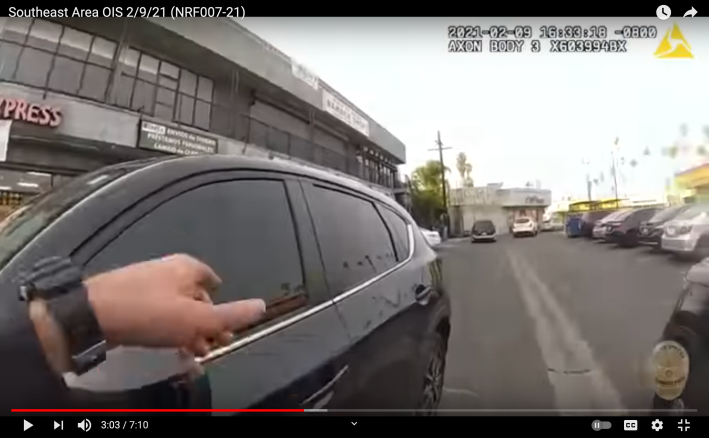
Meanwhile, Elster was apprehended on March 9, denied bail, and moved to the North County Correctional Facility in Castaic, where he will await his next court date (which appears to be September 13). If he is ultimately the hit with a charge of assault with a deadly weapon, it is a strike offense that could cost him up to ten thousand dollars in fines and three to five years in prison.
All for fleeing a stop he knew was unlawful.
___________
Find me on twitter, @sahrasulaiman, or email me at sahra@streetsblog.org. Other stories on the intersection of repressive policing, disenfranchisement, and trauma in the public space:
- 2/21 - LASD Won’t Name Deputies Involved in Killing of Fred Williams III at Otherwise Uninformative Inquest
- 9/20 – Gun Visible Sliding Along Ground Before 2nd Deputy Opens Fire on Dijon Kizzee, Contradicting New Sheriff Account (a deconstruction of the LASD claims regarding the August 31 killing of 29-year-old Dijon Kizzee in Westmont)
- 7/20 – Bystander Shot Six Times During Officer-Involved Shooting Left Homeless, Struggling to Recover while LAPD Treats Him as Suspect (Jermaine Welch was caught in crossfire at Broadway and 86th Pl., but instead of handing him back his belongings, LAPD handed him a warrant for his phone)
- 7/20 -Black and Brown Residents Speak to Urgency of Deep Systemic Transformation, Offer Insights Regarding Reinvestment
- 6/20 – How Beating of Unhoused Boyle Heights Man Exposes Woeful Inadequacy of LAPD Reform Proposals
- 2019 - The legacy of redlining and repressive policing in South Central via the story of Nipsey Hussle
- 12/19 - USC’s Public Safety Officers Tackle, Traumatize Woman for Hugging Tree on Sorority’s Lawn
- 3/19 - Handcuffing of Cyclist by USC Public Safety Raises Questions about Tactics, Oversight, Accountability
- 9/18 - As L.A. Ramps up Efforts to Get People off the Streets, a Young Man Struggles to Stay Housed
- 8/18 - Video of Moments Before Man Crushed by Blue Line Train Raises More Questions for Family in Mourning
- 5/18 - “I Can’t Go Everywhere I Thought I Could Go”: When Black and Brown Cyclists Need Safety from More than Traffic
- 2018 - Teen Hauled Off Metro Train, Cuffed for Putting Her Feet Up; “Burn the Witch!”: Public Enthusiasm for Dragging Rude Youth from Trains Highlights Gap in Metro’s Equity Platform
- 12/17 - Strategy Center Files Lawsuit Seeking Arrest, Citation, and Deployment Data from Metro, Law Enforcement Agencies
- 9/17 - Family of Man Crushed by Train During Altercation with Police over Fare Seeks Answers, Justice
- 4/17 - South Central Youth Assess Stasis and Change 25 years after the 1992 Unrest
- 10/15 - South L.A. Town Hall Ends in Protests but Residents Hope Dialogue with Mayor Is Just Beginning
- 1/15 - Are You Supposed to be Here?: Officer Harasses Black Cyclists during MLK Day Parade; Filed Under: Ugly Things You Find on the Interwebs (an FB page claiming black people steal bikes)
- 10/14 -Days of Dialogue Opens Conversation on Police-Community Relations in South L.A., Gets an Earful
- 3/14 - To Be or Not to Be a Gang-Banger: Is that Really the Question?
- 2013 - A Tale of Two Communities: New Security Measures at USC Intensify Profiling of Lower-Income Youth of Color (part 1); A Tale of Two Communities, Part II: LAPD Finds it Stirred Up Hornets’ Nest by Profiling USC Students of Color (part 2)
- 11/13 - Death and All His Friends Cast Long Shadows when they Make Regular Appearances in the Public Space
- 8/13 - “Invest in Us!” say South L.A. Youth in Response to Questions about How to Curb Violence at Town Hall with Garcetti
- 8/13 - “You Don’t Belong Here:” Sheriffs Profile Reporter
- 7/13 - Gardena PD Ticket, Harass United Riders of South Los Angeles for Taking Lane while the Case of the Hit-and-Run Victim They Were Honoring Remains Unsolved
- 2012 - It’s a Small World: How Gang Activity Impacts the Livability of Streets (part 1); Are You Ready to Rumble?: Street Fights Take More Violent Turns (part 2); Listening to the Streets in Order to Make Them More Livable: Part III in a Series (part 3)
Incorporating these issues into planning processes:
- Webinar on Policing and Mobility Underscores Struggle of Urban Planning to Center Justice (2018)
- Ancestors v. Polka Dots: Some Thoughts on Approaches to “Place-Making” (2017)
- Equity 101: Bikes v. Bodies on Bikes (2016)
- Man is Shot and Killed by the Officers He Called to Help Search for Stolen Bike. Is it a Livable Streets Issue? (2015)
- Election Reflections: “Law-and-Order,” the Resilience of White Supremacy, and You (2016)
- A Case for the Incorporation of Questions of Access Into Planning for Complete Streets (2013)
Other readings on the legacy of redlining:
- The Color of Law & Residential Segregation: A “Walking Toward Justice” Webinar
- Destination Crenshaw and the Rise of We-Built-this-Place-Making
- Art, the Crenshaw/LAX Line, and the Stories We (Don’t) Tell at Train Stations
- Baldwin Hills Crenshaw Plaza Offers Window into History of Redevelopment, Legacy of White Flight
- As Vermont/Manchester Transportation School Moves Forward, Community Reckons with Past, Wrestles with Form Change Should Take
- Jobs or Housing? Historic South Central Residents Decry Feeling Asked to Choose by Billion Dollar Reef Project
- What Constitutes Good Development? Luxury REEF Project Approved over South Central Residents’ Fears of Displacement
- Measure S and the Terrible, Horrible, No Good, Very Bad Status Quo
- Exploring the Legacy of Redlining via a New Documentary about Boyle Heights
